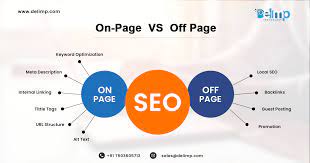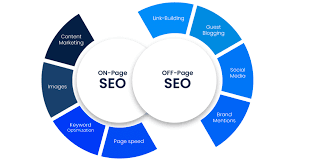The Power of On-Page and Off-Page SEO
Search Engine Optimization (SEO) is a crucial component of any successful digital marketing strategy. It involves various techniques and practices to enhance a website’s visibility on search engine results pages (SERPs). Two key aspects of SEO are on-page and off-page optimization, each playing a vital role in boosting a site’s ranking and driving organic traffic.
On-Page SEO
On-page SEO focuses on optimizing individual web pages to improve their search engine rankings and attract relevant traffic. This includes elements such as:
- Keywords: Strategic placement of relevant keywords in titles, headings, meta descriptions, and content.
- Content Quality: High-quality, relevant, and engaging content that satisfies user intent.
- Meta Tags: Optimizing meta tags like title tags and meta descriptions for better visibility in search results.
- Internal Linking: Creating a logical link structure within the website to improve navigation and distribute link equity.
- User Experience (UX): Ensuring the website is user-friendly, mobile-responsive, and loads quickly.
By focusing on these on-page factors, website owners can provide search engines with valuable information about their content, making it easier for them to understand the site’s relevance to users’ queries.
Off-Page SEO
Off-page SEO refers to activities conducted outside the website to improve its authority and reputation. Key off-page optimization strategies include:
- Link Building: Acquiring high-quality backlinks from reputable websites to increase domain authority.
- Social Signals: Engaging with audiences on social media platforms to boost brand visibility and drive traffic.
- Online Reputation Management: Monitoring and managing online reviews, mentions, and feedback to build trust with users.
- Influencer Marketing: Collaborating with influencers or industry experts to promote content and reach a wider audience.
The goal of off-page SEO is to establish the website’s credibility, relevance, and popularity in the eyes of search engines. By earning external validation through backlinks and social signals, websites can improve their rankings for targeted keywords.
The Synergy Between On-Page and Off-Page SEO
To achieve optimal results in search engine rankings, it’s essential to integrate both on-page and off-page SEO strategies harmoniously. While on-page optimization lays the foundation by ensuring content relevance and technical excellence, off-page efforts amplify this by building authority and trust signals from external sources.
In conclusion, mastering both on-page and off-page SEO techniques is imperative for enhancing a website’s visibility, attracting organic traffic, and ultimately driving business growth in the competitive digital landscape.
Top 6 Essential Tips for Enhancing On-Page and Off-Page SEO
- Optimize meta tags (title, description, headers) with relevant keywords.
- Create high-quality and unique content for better user engagement.
- Improve website loading speed for better user experience and search engine ranking.
- Use responsive design for mobile-friendliness and improved SEO performance.
- Build quality backlinks from authoritative websites to increase domain authority.
- Engage in social media marketing to drive traffic and improve brand visibility.
Optimize meta tags (title, description, headers) with relevant keywords.
To enhance the visibility and relevance of a website in search engine results, it is crucial to optimise meta tags such as titles, descriptions, and headers with relevant keywords. By strategically incorporating targeted keywords into these elements, website owners can signal to search engines the content’s focus and relevance to users’ search queries. Optimised meta tags not only improve click-through rates but also contribute to better indexing and ranking on SERPs. This on-page SEO practice plays a vital role in attracting organic traffic and improving the overall performance of a website in the digital landscape.
Create high-quality and unique content for better user engagement.
Creating high-quality and unique content is a fundamental tip for both on-page and off-page SEO strategies. By crafting valuable and engaging content that resonates with your target audience, you not only enhance user experience on your website but also increase the likelihood of attracting natural backlinks from other sites. This approach helps to establish your website as an authoritative source in your industry while encouraging users to spend more time on your site, ultimately improving search engine rankings and driving organic traffic.
Improve website loading speed for better user experience and search engine ranking.
Enhancing website loading speed is a critical tip for improving both user experience and search engine ranking through on-page and off-page SEO strategies. A fast-loading website not only provides visitors with a seamless browsing experience but also signals to search engines that the site is well-optimized and user-friendly. By prioritizing website loading speed, businesses can reduce bounce rates, increase user engagement, and ultimately boost their search engine rankings by delivering a superior online experience to both users and search engine crawlers.
Use responsive design for mobile-friendliness and improved SEO performance.
Implementing a responsive design for your website is a smart strategy to enhance mobile-friendliness and boost SEO performance. With the increasing number of users accessing the internet via mobile devices, having a responsive design ensures that your site adapts seamlessly to different screen sizes and devices. This improved user experience not only keeps visitors engaged but also signals search engines that your site is mobile-friendly, which can positively impact your search rankings. By prioritising responsive design, you are not only catering to the needs of mobile users but also laying a strong foundation for better on-page and off-page SEO results.
Build quality backlinks from authoritative websites to increase domain authority.
Building quality backlinks from authoritative websites is a fundamental strategy in off-page SEO that can significantly impact a website’s domain authority. By earning links from reputable sources, websites signal to search engines that they are trusted and relevant within their industry. These backlinks act as votes of confidence, boosting the site’s credibility and visibility in search engine results. This practice not only enhances the website’s authority but also strengthens its overall SEO performance, ultimately contributing to improved rankings and increased organic traffic.
Engage in social media marketing to drive traffic and improve brand visibility.
Engaging in social media marketing is a powerful strategy to complement on-page and off-page SEO efforts. By actively participating on social platforms, businesses can drive targeted traffic to their website while enhancing brand visibility and awareness. Sharing valuable content, interacting with followers, and leveraging social signals can not only boost a site’s authority but also cultivate a loyal community of engaged users. Incorporating social media into the overall SEO strategy creates a symbiotic relationship that amplifies online presence and establishes a strong digital footprint for long-term success.




